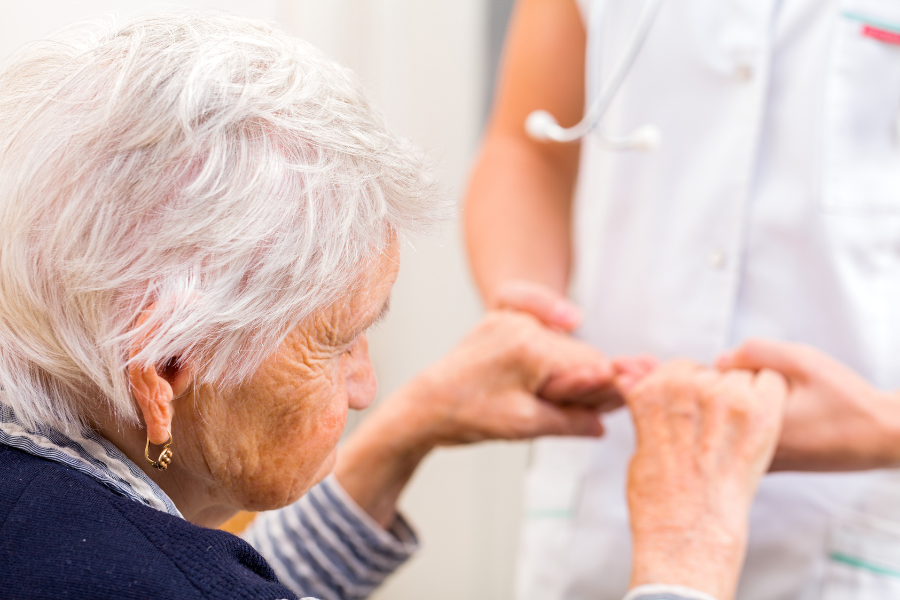Alzheimer's disease is a progressive mental illness characterized by degeneration of nerve cells in the brain and a decrease in brain mass; the most basic symptoms are memory loss, temporal and spatial disorientation and cognitive impairment.
Alzheimer's disease is usually associated with age, although it can also be caused by other diseases and is the main cause of dementia, although we tend to use it as a synonym.
Alzheimer's disease is a type of dementia and involves alterations in memory, reason and behavioral disorders, which are the symptoms that alert the family to get the diagnosis.
Depending on the stage of Alzheimer's disease, the person may have some autonomy, but as the disease progresses, this is lost until he or she becomes completely dependent on third parties to carry out basic activities of daily living.
Phases or stages of Alzheimer's disease
This disease does not progress in all people in the same way, although the symptoms worsen over time, the speed at which it progresses is different.
The average life span after diagnosis is between 4 and 8 years, but depending on other factors, early detection and the most appropriate care you can live as long as possible.
How does the disease progress according to the phase or stage and what symptoms can be seen?
Basically, 3 phases or grades are described that help physicians to define the patient's condition within the framework of evolution: the light, moderate and severe phases.
Initial phase
In the early stage of Alzheimer's disease, the person is able to function independently with total normality, can drive, work, have a social life, etc. They will begin to notice small memory losses, difficulty in finding the right word, forgetting where they have left any object, but in general usual things that can be attributed to the passage of time or stress.
Both the person involved and the family begin to notice the symptoms and usually go to the doctor with visibility of detection of memory or concentration problems, resulting very frustrating for the patient.
Among the symptoms we find the most frequent ones:
-Difficulty in remembering new names, as well as dates or recent events.
-Problems finding words or the names of familiar people.
-Appearance of very slight problems to perform some tasks or function as naturally as usual.
-Mood changes, showing irritability without warning, may also show times when you are very down or slightly depressed as part of the onset of the disease.
Moderate
During the moderate stage of Alzheimer's disease, people with the disease become more confused and forgetful, begin to need help with daily activities and personal care, become visible to anyone who has a conversation with the patient, alerting the entire family to determine a diagnosis.
Some of the most frequent behaviors in this stage are:
-Memory disturbance, not remembering even if he has just been visited or if he has eaten, feeling neglected by his relatives that he does not see, even if he has been with them very recently. The memory that is usually affected is the recent one. They may suffer episodes of apparent lucidity in which they remember, for example, an event that occurred with their mother who died 20 years ago, for example, moving to the present, thus showing great confusion in their conversations.
-The vocabulary is impoverished, they do not find the right words and it is impossible to finish a sentence, requiring the help of those next to them to make themselves understood, also generating frustration, especially in those who have always been quite talkative.
-It is also very common to be misplaced, especially in unfamiliar places. It is common for them to not fully understand that they are in a doctor's office or to believe that a friend or relative is someone else, getting confused when it comes to having the right conversation with each person.
For this reason and at this stage it is best that the person spends as little time as possible alone, so he/she will feel more secure and the different situations will generate less uncertainty for him/her.
-They start to create situations in their mind that are not real, hear or understand things that are not happening, such as that they are suffering a robbery, that a person has insulted them, becoming more aggressive and causing agitation especially at the end of the day when their body and mind are already more tired.
-It is very normal for incontinence to appear at this stage, making caregivers often opt for diapers to ensure the person's cleanliness, since it is very normal that they do not detect that they have needs and therefore do not reach the bathroom.
-Inaccurate gestures, they may not be able to write well, they may not hold the cutlery incorrectly or they may not be able to put a spoon in their mouth, and they may need help in their most common activities, for example, personal hygiene.
Severe phase
This is the expected final phase in which you have to be 100% involved with the patient as he/she becomes completely dependent on third parties.
The late stage causes all movements, physical and cognitive capacities of the patient to diminish.
All the symptoms detected in the previous stages of Alzheimer's disease are now aggravated, requiring total assistance from the caregiver.
Very severe cognitive and functional impairment is experienced.
-The individual loses the ability to communicate coherently and cannot express how he/she feels, can no longer converse or speak in a way that makes sense, although he/she may occasionally say words or phrases, it is no longer the usual, his/her vocabulary is reduced, using a scarce amount of words.
-Require daily assistance with personal care. Full assistance with eating, dressing, toileting and all other daily personal care tasks.
-They experience a decrease in physical and cognitive abilities. Many times at this stage they require a walker or wheelchair because they frequently fall when they try to do it on their own.
-The muscles suffer stiffness and there is a lack of reflexes or a considerable decrease in them. From here derives one of the most common problems in this last stage and that is that they are not able to swallow so we must avoid giving liquids to the person, including water, thickeners are used to prevent food from going to the lung and cause other infections or conditions.
- The use of diapers is absolutely necessary since the patient can no longer tell when he/she needs to go to the bathroom, making this task difficult for the caregiver and the family.
Not all people evolve in the same way or have the same time in the different stages of Alzheimer's disease. Observing and locating the disease in time to put an appropriate treatment makes life expectancy with this disease increase every day. The intense research in Alzheimer's makes the evolution of the disease more hopeful, so it is very important to go to the specialist as soon as possible at the first sign of onset to obtain a diagnosis.
From the Telecare Service of El Corte Ingles, SICOR teleassistance El Corte Ingles, we support both the patient and the family or caregiver to be with you in any situation.
The SOS smart watch and the sicorAsiste and sicorASISTE Family Apps provide support tools for the family caregiver: real-time geographic location, safety geozones, automatic fall detection... Also, from our Care Center, specialized professionals remind the caregiver of medication intake, medical appointments and personalized follow-up.
Our technology allows us to provide the best care for your family inside and outside the home.

